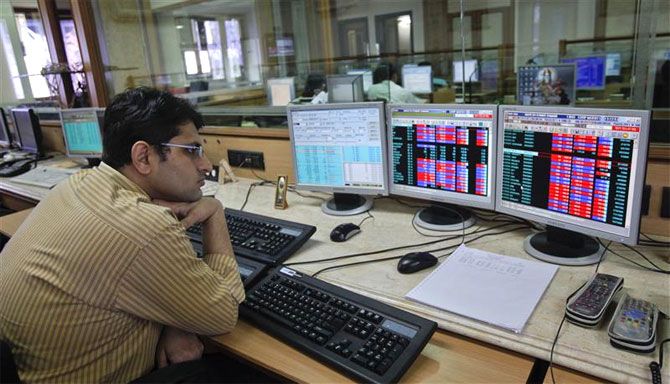 | « Back to article | Print this article |
'We think FY18 will end with a 10 to 12 per cent earnings growth, but FY19 will see a recovery to over 15 per cent.'

Mutual fund investments in equities are near record highs at a time foreign institutional investors have been mostly fence-sitters.
Jyotivardhan Jaipuria, founder and managing director, Veda Investment Managers, tells Puneet Wadhwa that FIIs are justified in investing in developed markets which look more attractive.
Once growth picks up back home, we should see them come back to India, he adds.
Is the scale of public sector bank recapitalisation and the Bharatmala project too ambitious?
There was a fear that the debate around the goods and services tax implementation would mean that the government would tend to avoid any further 'big bang' reforms till the election in 2019.
The scale of the Rs 2.11 lakh crore recap showed that the government has taken the bull by the horns and in one bold move provided a solution to the vexed issue of bank capitalisation.
This will reduce the risk premium in PSBs and make lending easier as well as enable banks to provide for non-performing loans adequately.
While this takes care of the supply side, a big turn in investment demand in India is still likely to take longer, since low utilisation levels mean that the private sector capital expenditure will still be slow.
That is where the Bharatmala project ensures that the government will continue to spend on roads and highways, an area which has seen a strong thrust over the past few years.
How do you see the markets playing out in the next one year?
There has been a sharp rally, both in the domestic as well as global markets.
In fact, developed markets have outperformed emerging markets, including India.
The biggest risk remains a reversal in global markets, which will hurt India too.
We are getting into a period where after 10 years of easy monetary policy, the central banks are starting to normalise monetary policy in the developed world.
We will see the US Federal Reserve shrinking its balance sheet soon and the European Union will start tapering its quantitative easing and probably stop QE over the next year.
The impact of this on global equities (and indeed on bonds) over the next year is the biggest risk to markets.
Domestically, the pace of earnings recovery remains a key to watch for.
Overall, we think return from equities in 2018 will be lower than in 2017.
Why have FIIs been fence-sitters?
FIIs have to look at the whole world in a relative context. Two factors are playing out here.
First, relative valuations in many EMs (emerging markets) are much cheaper.
Second, we have seen an uptick in global growth momentum at a time the Indian growth story has been constrained by the implementation of GST.
We have seen developed markets outperform EMs and to that extent foreign investors are justified in playing developed markets over emerging ones.
Once growth picks up back home, we should see foreign investors come back to India.
Will the booming primary market hurt secondary market liquidity?
The initial public offering market will suck some liquidity out of the system.
This is a trend seen in every cycle where companies tend to increase issuances as markets go up and valuations start to seem attractive for the issuer companies.
In many cases now, IPOs are tending to come at valuations that are steeper than those of similar companies in the secondary markets.
Can mid- and small-caps outrun their large-cap peers over the next one year?
Mid-caps are currently expensive relative to large-caps.
In the near-term, they may underperform, especially in any correction.
However, over the next few years, we see mid-caps continuing to outperform as they are more leveraged to an economic recovery.
What are your sector preferences?
We continue to play domestic companies relative to exporters, but near-term valuations are making this trade less compelling.
Within domestic plays, we still like the rural stories and select capital goods companies benefiting from government capex.
We are not as excited about consumer staples due to valuations.
Are markets ready for a further delay in earnings growth?
We think FY18 will end with a 10 to 12 per cent earnings growth, but FY19 will see a recovery to over 15 per cent.
The GST impact was largely felt in the June and September quarters. But, over the next four quarters, earnings will bounce, though this may or may not represent a major secular revival.
This is because the next four quarters will see a bit of distorted base due to demonetisation in the December and March quarters, and the GST in the June and September quarters.
Photograph: Reuters